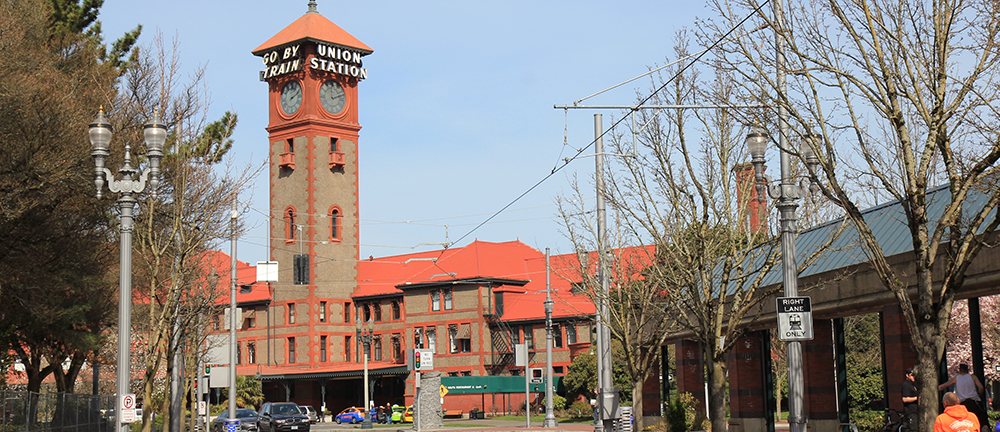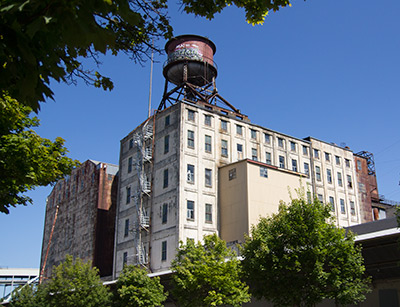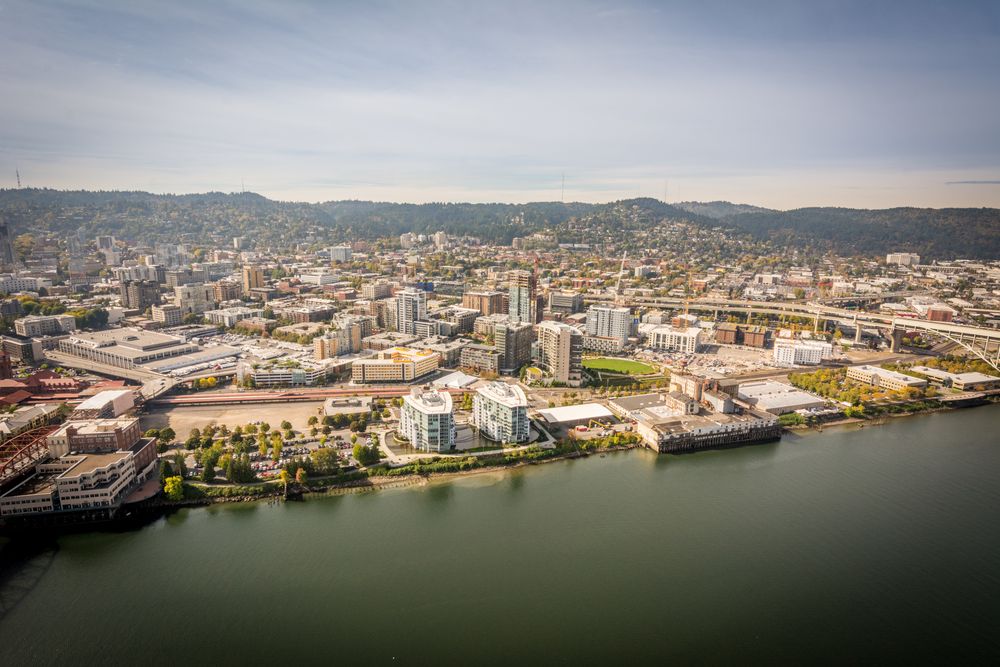Contact: Sarah Harpole, (503) 823-3337, email
Centennial Mills
Prosper Portland acquired Centennial Mills from ADM Milling Company in 2000 to fulfill the River District Urban Renewal Plan’s stated objective of enhancing the waterfront with public open spaces and to facilitate connectivity between the River District, the Willamette River and the Willamette River Greenway.
History
Crown Mills, which subsequently became known as Centennial Mills, was operated as a flour mill on Portland’s waterfront between 1910 and 2000. Originally built by Balfour-Guthrie & Company, a Liverpool-based exporter, Centennial Mills was once one of the largest such facilities in Oregon and the last major flour milling operation in downtown Portland. Milling grain was among Oregon’s earliest and most significant industrial endeavors, and the wheat trade became Oregon’s single largest export during the early 20th century. Wheat grown in the semi-arid areas of eastern Oregon and Washington was transported by rail to milling operations concentrated on Portland’s waterfront where it was then shipped by the “wheat fleet” to Europe, South America, Japan, China, and elsewhere. The importance of the wheat trade to Portland’s economic and waterfront development and mills such as Centennial Mills has been documented in the publication Grain, Flour and Ships – The Wheat Trade in Portland, Oregon.
Recent History
The City relocated the Police Department’s Mounted Patrol Unit (MPU) to the site in 2002 as an interim use due to displacement from their former operating location under the Lovejoy ramp. In 2006, Prosper Portland with the Bureau of Planning to complete the Centennial Mills Framework Plan which outlines Portland’s interest and aspirations for redevelopment of the site. The framework plan was the result of a six-month public process and was approved by the Portland City Council in December 2006. The plan does not posit particular redevelopment schemes for the property. Rather, it outlines various development opportunities and lays out five key principles to guide redevelopment: Provide Open Space, Capture History, Define a Community Focal Point, Strengthen Connections, and Embrace Sustainability. Redevelopment of the site is also anticipated to advance the goals of the agency’s Strategic Plan.
Between 2006 and 2013, Prosper Portland engaged two different development teams (LAB Holdings and Harsch Investment Properties) to undertake project feasibility work, but both attempts at redevelopment were ultimately deemed infeasible due to a combination of market conditions, technical challenges, and resource constraints.
In December 2014, the Prosper Portland Board adopted Resolution 7089, making an emergency declaration relating to the physical condition of Centennial Mills, and instructed staff to seek a contractor for the selective demolition and salvage of the site’s various buildings. Prosper Portland announced in March 2015 the selection of Tigard, OR-based Northwest Demolition & Dismantling as the Construction Manager/General Contractor (CMGC) for that work.
From April to June 2015, Prosper Portland staff, with assistance from KLK Consulting and Northwest Demolition and Dismantling, performed a series of pre-demolition investigations to determine the scope, schedule, and safety measures necessary for accomplishing the selective demolition of the site.
The Mounted Patrol Unit vacated the site on May 31, 2015, relocating its daily operational offices to the east end of the Hawthorne Bridge. The horse stables have been relocated to the Lake Oswego Hunt Club.
On July 16, the Prosper Portland Board of Commissioners approved Resolution 7137, beginning the first phase of the selective demolition of Centennial Mills. While the resolution excluded demolition of the Feed and Flour Mill buildings, the Mayor’s office has requested additional investigation into the costs and feasibility of preserving these structures.
Early preparatory work began on site in August and September 2015. Work included installation of temporary roadways for heavy equipment, utilities termination and rerouting, artifact salvage, and temporary structural shoring. During this period, demolition crews witnessed several instances of structural collapse and accelerating deterioration. Due to the heightened danger, non-demolition personnel are no longer permitted on the Property.
Phase One demolition of Warehouses A, B, C, D, and F as well as Elevators A, B, and C began in fall 2015 and concluded in late spring 2016.
Phase Two of the demolition began in June 2016. The second phase of the selective demolition removed the underlying concrete wharf deck, with the contractor using a floating barge to cut out large sections and then life the pieces onto the upland bank for crushing. Due to the potential for riverine impacts, the phase required oversight by the Army Corps of Engineers, Department of State Lands, and Department of Environmental Quality (DEQ). Coming in under budget, the contractor safely pulled down the most dangerous buildings, removed collapsing wharf structures, salvaged hundreds of thousands of board feet of timber, and saved numerous historical artifacts. The painstaking process, which included extensive clean-up of the Willamette riverbank, earned recognition from both the State Historic Preservation Office and the Department of Environmental Quality.
As demolition progressed, the foundation of the Feed Mill was finally exposed and accessible to further inspection. Unlike the Flour Mill, which rests firmly upon driven friction piles, the Feed Mill’s foundation only consisted of a shallow stemwall and concrete footings, built on fill material. The team observed a significant difference between the level of the other surrounding foundations and that of the Feed Mill. The assessment was that the building had settled approximately six inches at its northwest corner, resulting in the five-story structure leaning slightly in that direction. This was a significant setback to the feasibility of preserving and restoring the Feed Mill building.
In September 2016, the Prosper Portland Board approved Resolution 7208 by a one-vote margin, authorizing demolition of the Feed Mill building. Demolition of the structure took an additional six months to complete due to a large amount of previously unknown asbestos-containing material being discovered inside the building, as well as large areas of unreinforced structure requiring careful demolition procedures in order to prevent uncontrolled collapse. Demolition of the Feed Mill concluded in March 2017, completing Northwest Demolition and Dismantling’s involvement in the redevelopment efforts. Over the course of the demolition phases, Prosper Portland invested $15,234,552, creating 85 construction jobs. The design and construction team included NW Demolition, KLK Consulting, KPFF Engineering, AMEC, Hart Crowser, and Flowing Solutions.
In March 2017, City Council passed a resolution precluding the return of the Mounted Patrol Unit and approving redevelopment of the entire site. At the meeting, Prosper Portland staff provided City Council with a conceptual program that addressed the principles of the 2006 Framework Plan. The conceptual program includes extension of the greenway trail, public access through the site, mixed-income housing, and renovation of the iconic Flour Mill building.
In early 2018, after issuing a call for offers to develop the Centennial Mills site, Prosper Portland selected Lynd Opportunity Partners as the development partner for the property. Following extensive negotiations to refine the development proposal and reach agreement on deal terms and next steps, Lynd declined to submit a revised letter of interest on the property, citing concerns about their ability to deliver a project that met the city’s requirements and expectations.
Through continued marketing of the property, Prosper Portland solicited additional interest in the property, and in December 2022 entered into a Disposition and Development Agreement with a prospective buyer (1362 Centennial Mills, LLC). The agreement obligates the buyer to acquire the property no later than December 2024. The parties additionally reached agreement to grant an underground utility easement to PacifiCorp in May 2023, which is necessary to support the Portland Harbor Superfund cleanup.



